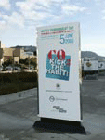5 June 2008: Celebrations on World Environment Day, 5 June, focused on climate change, with the theme “Kick the CO2 Habit.” At the New York launch of the “Together” campaign by the Climate Group, an international charity dedicated to working with big business and government to help solve climate change, Ban Ki-moon, UN Secretary-General, said […]

5
June 2008: Celebrations on World Environment Day, 5 June, focused on climate
change, with the theme “Kick the CO2 Habit.” At the New York launch of the
“Together” campaign by the Climate Group, an international charity dedicated to
working with big business and government to help solve climate change, Ban
Ki-moon, UN Secretary-General, said “Climate change is too big a challenge for
any country, corporation, or community to address alone. Instead, it requires a
broad coalition acting together for the greater good… we are all part of the
solution.” The UN Environment Programme (UNEP) launched two reports on World
Environment Day.
One publication, “Kick the Habit: The UN Guide
to Climate Neutrality,” is categorized by UNEP as a “Rough guide to low carbon
living.” The other publication, “Climate Change Adaptation and Mitigation in
the Tourism Sector,” was produced in collaboration with the UN World Tourism
Organization (UNWTO). On World Environment Day, UNEP publicized actions the
public can take to mitigate climate change, including reducing the weight of
luggage taken aboard airplanes, improving insulation and avoiding tumble
clothes dryers. Discussing the range of policy and individual actions that affect
climate change, Achim Steiner, UN Under-Secretary-General and UNEP Executive
Director, said “…the public have the power to change the future – have the
power to personally and collectively influence economies to ‘Kick the CO2
Habit’.” [UN
Secretary-General’s statement] [UN
News Centre article] [UNEP
Press Release: 2008 World
Environment Day website] [“Climate
Change Adaptation and Mitigation in the Tourism Sector”]